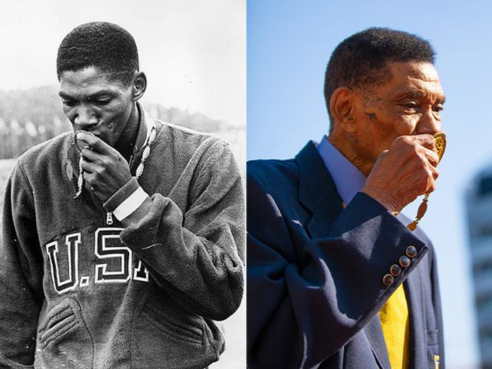Otis Davis, Two Time AAU National Champion and Olympic Gold Medalist, Passes Away at 92
09/18/2024
The Amateur Athletic Union mourns the loss of an AAU and Olympic Champion today, learning of the passing of track star Otis Davis.
Photo from World Athletics
###
The Amateur Athletic Union mourns the loss of an AAU and Olympic Champion today, learning of the passing of track star Otis Davis.
Davis passed away on 9/14/24 at the age of 92. Despite a short career as a runner, he was a two time AAU National Champion in the 400m, he went on to represent the United States at the 1960 Olympic Games in Rome where he would win two gold medals (400m and 4x400m). He is also a member of the National Track Hall of Fame.
The following article was posted by United States Track and Field Federation yesterday in remembrence of the famed track star:
###
Otis Davis, a double gold medalist in the men's 400 meters and 4x400 meter relay at the 1960 Olympic Games in Rome, died September 14 at the age of 92.
###
The Amateur Athletic Union mourns the loss of an AAU and Olympic Champion today, learning of the passing of track star Otis Davis.
Davis passed away on 9/14/24 at the age of 92. Despite a short career as a runner, he was a two time AAU National Champion in the 400m, he went on to represent the United States at the 1960 Olympic Games in Rome where he would win two gold medals (400m and 4x400m). He is also a member of the National Track Hall of Fame.
The following article was posted by United States Track and Field Federation yesterday in remembrence of the famed track star:
###
Otis Davis, a double gold medalist in the men's 400 meters and 4x400 meter relay at the 1960 Olympic Games in Rome, died September 14 at the age of 92.
Born on July 12, 1932, in Tuscaloosa, Alabama, Davis graduated from Druid High School, an all-Black school in Tuscaloosa where he was a standout athlete in basketball and football. He served in the Air Force for four years after graduating from high school and then played basketball at Los Angeles City College before transferring to Oregon, where basketball's loss would be track and field's gain.
A scholarship basketball player at Oregon, Davis struggled with the team's conservative offense, and in 1958 legendary Ducks coach Bill Bowerman thought Davis would be a good add to the track and field team as a jumper due to his leaping abilities on the basketball court. Davis competed in the high jump and long jump that year, but also quickly became a force in the short sprints. When he moved up to the 400 the next year, he was almost instantly a national contender.
Finishing seventh in the NCAA 400 in 1959 as a senior, Davis geared up for the 1960 Games by winning his first AAU national title that year with a meet record 45.8. At the Olympic Trials at Stanford, Davis and the other competitors faced a difficult task with the 400 heats run only 90 minutes before the final.
After winning his heat in 46.0, Davis had to make up a lot of ground in the final, moving from sixth coming off the final bend to claim third and an Olympic berth in 46.7 seconds. Before the Games, Davis bettered the 400m world record with a 45.67 at Bern, Switzerland, and he again lowered it to 45.62 in the semifinal at Rome.
In the final, Davis lined up in lane three, with Germany's Carl Kaufmann in lane one to his inside. Davis gained ground steadily and had the lead going into the homestretch. Kaufmann valiantly tried to overtake Davis, but the American had the better lean at the line and was awarded the victory as both men were timed at 44.9, breaking the world record and becoming the first men to break 45 seconds. The unofficial fully automatic photo finish times gave Davis the edge, too, 45.07-45.08.
Davis earned his second gold at Rome by anchoring the U.S. 4x400 relay to a world record 3:02.37, again turning back Kaufmann on the final leg. Davis was joined on that quartet by Jack Yerman, Earl Young, and Glenn Davis.
In 1961, Davis defended his AAU 400 title with a 46.1 and then retired from the sport. He became a teacher in Springfield, Oregon, followed by stints in California and Europe as a physical education instructor and recreation specialist before moving to New Jersey. He founded and served as president of the U.S. Olympians Tri-States Chapter, and founded United Athletes, LLC, an organization that recognized academic achievement and community service by young athletes.
Davis, a 2004 inductee into the National Track & Field Hall of Fame, is also a member of the Oregon Sports Hall of Fame (1981), University of Oregon Hall of Fame (1992), and New Jersey Sports Writers Association Hall of Fame (1996). His image is prominently visible on the tower at Hayward Field, the track and field stadium at the University of Oregon.
Davis is survived by his daughter, Liza, and grandson, Sean.
 Email
Email Print
Print








